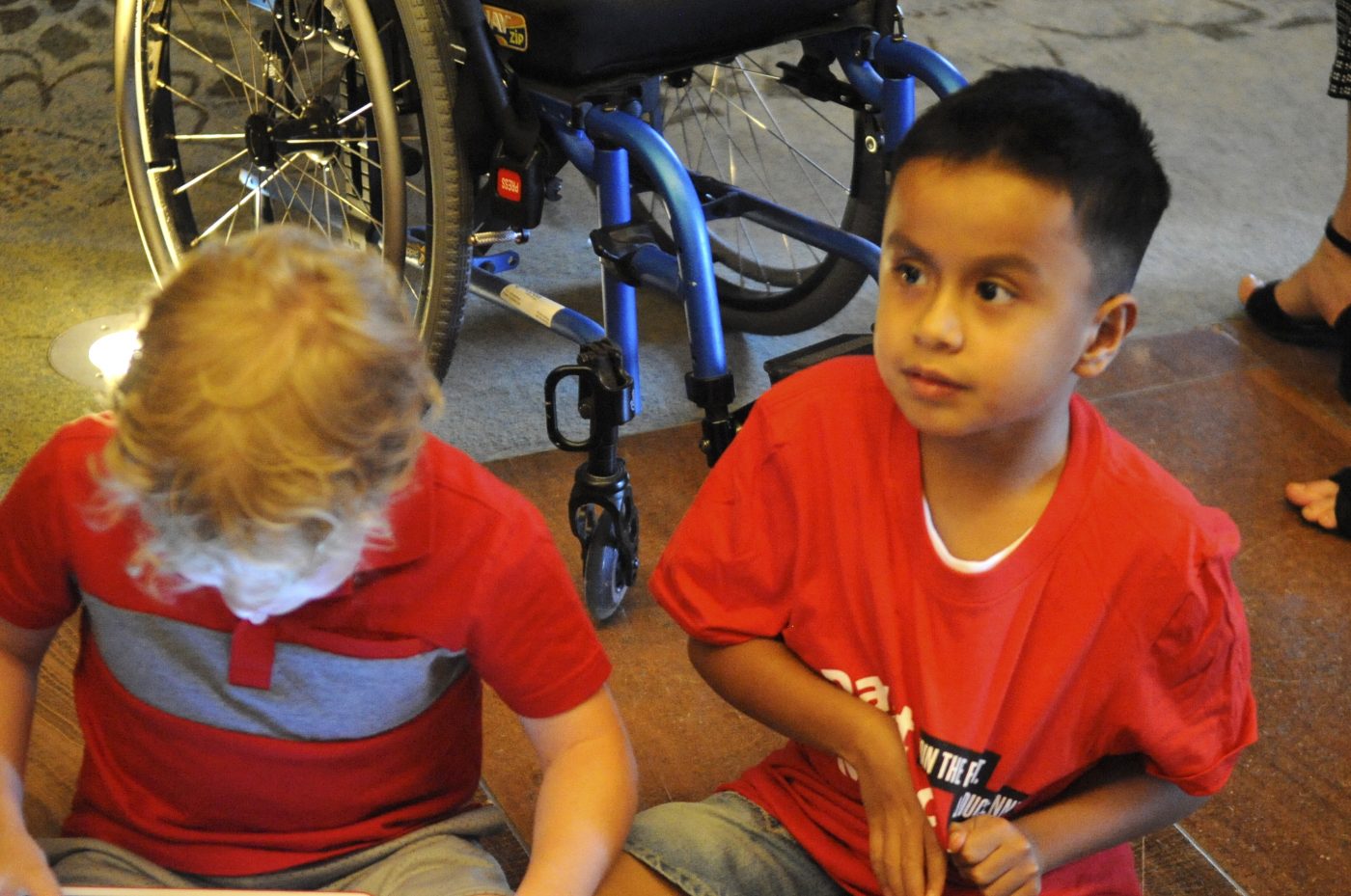#PPMD2018 – Don’t Overlook Dental and Digestive Issues, Duchenne Experts Advise
Written by |

Boys with Duchenne play while their parents attend the PPMD 2018 annual conference in Scottsdale, Arizona. (Photo by Larry Luxner)
With so much focus on the very real dangers of muscular, pulmonary and cardiac decline, it’s easy for moms and dads of Duchenne kids to forget about less urgent issues like dental health and digestion.
But they shouldn’t, said experts speaking at Parent Project Muscular Dystrophy’s recent 2018 Annual Conference.
“Dental hygiene is terrible in Duchenne, even worse than in SMA, and we don’t know why,” Dutch orthodontist Elizabeth Vroom told more than 600 people gathered at the June 28-30 meeting in Scottsdale, Arizona. “It’s really a serious problem and we have to speak about that.”
Vroom knows all too well. As the mother of an adult son with Duchenne, she’s founder and president of Duchenne Parent Project Netherlands, as well as chair and co-founder of the World Duchenne Organization.
In her talk (which begins at 2:18:23), Vroom said studies on the dental problems of Duchenne boys go back more than 20 years, but that “the whole Duchenne field never picked it up, because these were neurologists, and neurologists never listen to dentists.”
Vroom said the lack of dystrophin, which causes Duchenne in the first place, is also responsible for progressive weakness of masticatory (chewing) and perioral (around the mouth) muscle groups, the tongue’s enlargement and reduced motility, and progressive oropharyngeal and hypolaryngeal weakness (which causes problems with swallowing).
“Lots of muscles are involved, including those needed for speaking, eating, chewing and swallowing,” she said. Among other things, the genetic disease causes the tongue to thicken as boys grow older and their Duchenne progresses. Chewing food well can be difficult and choking a frequent problem, as is a feeling that food particles are stuck in the throat.
Dental suggestions for Duchenne
“Dental health is poor in DMD. That’s really sad because, imagine, you’re in your late 20s or early 30s, you have to lay in a dental chair, you have a ventilator and a big tongue, and there’s a risk of aspiration,” she said. “So why not, as parents, start early and make sure children with DMD get all their prophylactics — and please stop sugar!”
Vroom said added sugar combined with low pH is “terrible” for teeth, particularly sweet yogurt drinks that may be low-fat or even fat-free but are loaded with sweeteners.
Among Vroom’s recommendations:
- Avoid treatment under full anesthesia whenever possible.
- Wisdom teeth are often removed without any reason. If they’re not causing any problem, leave them alone.
- Rinse after every meal, avoid breathing with your mouth and keep your tongue in. Drink water after meals to clear the oropharyngeal area (middle part of throat).
- Chew sugar-free gum frequently to exercise masticatory muscles.
- Don’t begin orthodontic treatments without a thorough understanding of all aspects of Duchenne.
“Aesthetics are very important, so lining up front teeth can and should be done,” she said. “We also think there should be better training for caregivers. Dental hygiene becomes more difficult when hand function decreases and other people — often not trained — have to take over.”
Constipation a common issue in DMD
The absence of dystrophin also affects digestion in Duchenne patients. While not life-threatening, these issues have a huge impact on quality of life, said Kent Williams, a pediatric gastroenterologist at Nationwide Children’s Hospital in Columbus, Ohio.
“Kids with Duchenne gain weight and grow differently, regardless of the use of steroids and medications,” said Williams (whose presentation begins at 2:40:35). He stressed the importance of regular six-month checkups. “It’s very important to meet with a registered dietician, not a physician.”
Also crucial is screening for dysphagia (difficulty swallowing), reflux, gastroparesis (stomach paralysis), and constipation. Both vitamin D levels and dietary calcium intake should also be checked on an annual basis.
“Now I’m even more convinced that screening for swallowing needs to be done at a very early age, to find out if kids are taking in adequate nutrition and calories,” he said, recommending tests such as the Sydney Swallow Questionnaire, a speech therapy evaluation, a video swallow study, and a fiberoptic endoscopic evaluation of a child’s ability to swallowing.
Gastroparesis is a common problem in Duchenne. Progressive symptoms include vomiting, feeling full quickly, bloating or nausea, decreased appetite, and an inability to eat full meals.
“The funny thing, though, is this doesn’t mean your stomach is having problems. This could actually be early signs of constipation,” Williams said. “Constipation is highly under-recognized, under-treated and underestimated. It’s an overlooked cause of a reduction of appetite and can also be the cause of other symptoms. Just treating constipation can improve appetite.”
Williams cited a 2016 study, “Constipation in Duchenne Muscular Dystrophy: Prevalence, Diagnosis, and Treatment.” The article, published in The Journal of Pediatrics, found that almost half (46.7 percent) of 120 boys and young men with Duchenne met the criteria for constipation. And of those with constipation, only about half (43.6 percent )were being treated — and only half of those treated reported that their constipation was resolved.
“There’s also a concern with treating constipation,” Williams added. “If you’re in a wheelchair and I treat you for constipation, it means you’ll be pooping more, and that gets into a quality-of-life issue.”
Displaying a “poop chart” listing seven types of stool according to key three criteria — size, shape and consistency — Williams said parents need be aware of the bathroom habits of their sons with Duchenne.
“Has your child ever passed anything that just amazes you? Does your child clog the toilet? If so, automatic constipation,” he said, adding that the frequency of bathroom visits is largely irrelevant. “You can go six times a day and still be severely constipated.”







